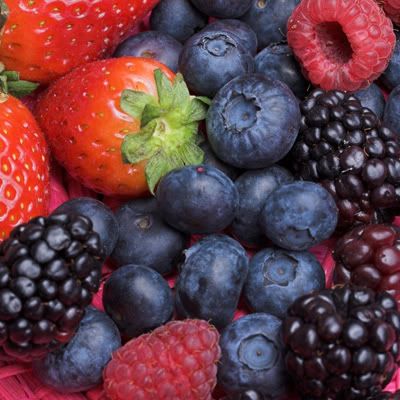Super foods are loaded with compounds important for a long and healthy life. They contain large amounts of nutrients called antioxidants and phytochemicals which may have the ability to help prevent and, in some cases, reverse the effects of aging, cardiovascular disease, arthritis, diabetes, high blood pressure and certain types of cancer.
Berries such as strawberries, blueberries, raspberries and blackberries are among the most potent super foods, and research has shown that eating berries has a positive and profound effect on health and disease.
Naturally sweet strawberries, blueberries, raspberries and blackberries are packed with pectin, a type of soluble fiber that promotes a feeling of fullness. It also has the potential to help lower cholesterol and improve insulin resistance. Other berries including blueberries, blackberries and raspberries are also a fresh and healthy addition to a weight loss diet plan. One cup of each berry has less than 84 calories, and just like strawberries, each is packed with nutrition, versatile in the kitchen and cholesterol-free.
Research also shows that individuals who eat strawberries on a regular basis have higher blood levels of folate, vitamin C, phytonutrients and a higher intake of fiber than those who don’t eat strawberries. So, it appears that by including strawberries in your diet, they might just help you achieve and maintain a lowered risk for developing certain diseases.
With their powerful antioxidant protection, blueberries can improve nighttime vision, promote quicker adjustment to darkness, and promote faster restoration of visual clarity after exposure to glare. According to the USDA Human Nutrition Research Center on Aging, laboratory studies show a diet including blueberries may improve motor skills and reverse the short-term memory loss that comes with aging or age-related diseases such as Alzheimer’s. Researchers have also identified a compound in blueberries that helps to reduce the risk of infection.
Blackberries are a soft and delicate fruit which grow on thorny bushes or trailing vines. Actually, they are a drupelet, or a cluster of fruits, like a bunch of grapes, and the seed inside each drupelet contributes to the berry’s nutrient value. Fresh blackberries were recently identified as a top cancer fighter. As a matter of fact, studies show blackberries have one of the the highest antioxidant contents per serving of any food tested.
In a 2006 study published in The American Journal of Clinical Nutrition, scientists indicated that blackberries’ antioxidant content of 5.75 millimoles per serving was far above that of other foods. This means that regular consumption of blackberries may have a positive impact on health, athletic performance and disease risk. Anthocyanins, or the “flashy flavonoid,” give blackberries their glossy, dark color, and it’s this powerful phytonutrient that’s been shown to protect the brain from oxidative stress and may even reduce the effects of age-related neuronal conditions such as Alzheimer’s disease and dementia.
Raspberries can be found in assorted colors including gold, black and purple, but red raspberries are the most common. These fruits are as nutritious as they are beautiful.
Raspberries are low in calories and fat, cholesterol-free, high in fiber and a good source of vitamin C, folate, potassium and magnesium. New research even suggests that eating red raspberries may prevent cancer by inhibiting the abnormal division of cells and promoting the normal death of healthy cells.
Raspberries are also are rich sources of Vitamin C and the flavonoids quercetin and gallic acid, which have been shown to play a role related to a person’s heart health and in the prevention of cardiovascular diseases, obesity and age-related decline.
Interestingly, raspberries contain ketones. Raspberry ketones are similar to capsacin found in red pepper that’s known for its ability to inhibit the growth of cancer cells. In Japan, red raspberry ketones are currently being used as a weight loss supplement, though much more research is needed to determine if keytones are at all effective in weight management.
Berries are also ideal for a weight loss diet, since they’re sweet and delicious without lots of calories or fat. Strawberries are America’s most popular berry, and a one-cup serving only has 53 calories. While they’re convenient as a snack, strawberries can add zip to hot or cold cereal, jazz up a salad or add substance to low-fat parfaits. And don’t let those ripe strawberries go to waste; they’re perfect for smoothies and fruit drinks.
Thanks, Driscoll's !
